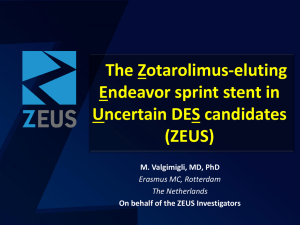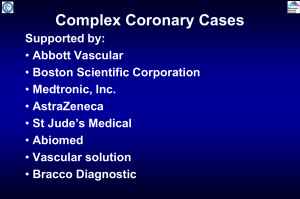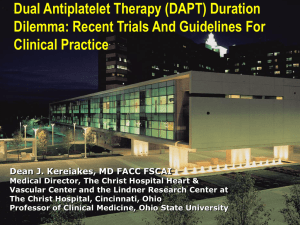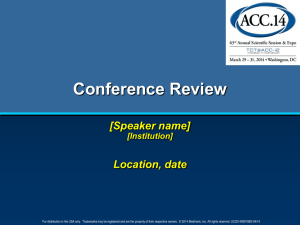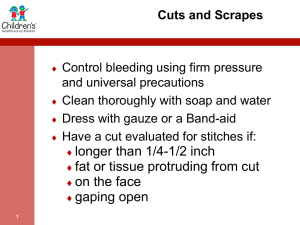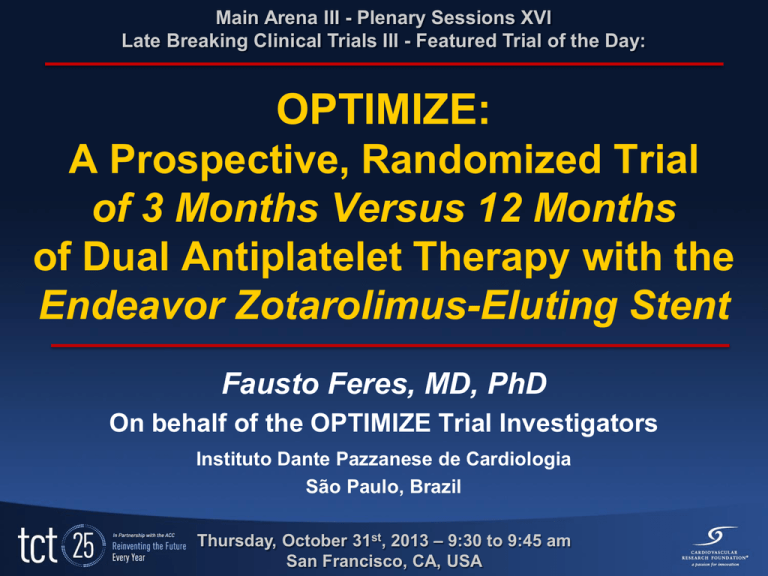
Main Arena III - Plenary Sessions XVI
Late Breaking Clinical Trials III - Featured Trial of the Day:
OPTIMIZE:
A Prospective, Randomized Trial
of 3 Months Versus 12 Months
of Dual Antiplatelet Therapy with the
Endeavor Zotarolimus-Eluting Stent
Fausto Feres, MD, PhD
On behalf of the OPTIMIZE Trial Investigators
Instituto Dante Pazzanese de Cardiologia
São Paulo, Brazil
Thursday, October 31st, 2013 – 9:30 to 9:45 am
San Francisco, CA, USA
Disclosure Statement of Financial Interest
Fausto Feres, MD
Within the past 12 months, I or my spouse/partner have had a financial
interest/arrangement or affiliation with the organization(s) listed below.
Affiliation/Financial Relationship
Company
•
•
Consulting Fees/Honoraria
Biosensors, Eli Lilly, Medtronic
The study was funded by Medtronic Comercial Ltda, Sao Paulo, Brazil.
.
Background
• Current recommendations for
antithrombotic therapy after drug-eluting
stent (DES) implantation include prolonged
dual antiplatelet therapy (DAPT).
• However, the impact of such a regimen for
all patients receiving a specific DES system
remains unclear based on scientific
evidence available to date.
Levine GN, et al. Circulation. 2011;124:e574-651
Wijns W, et al. Eur Heart J. 2010;31(20):2501-55
DAPT Post-DES
• Premature DAPT discontinuation has been
determined to be one of the most powerful
predictors of thrombotic events after first
generation DES.
• Also, several other issues have been
identified with prolonged DAPT, including
bleeding, compliance, and cost.
Iakovou I, et al. JAMA. 2005;293:2126–30
Bhatt DL, et al. NEJM. 2006;354:1706-17
Objective
• The Endeavor® zotarolimus-eluting stent
(E-ZES) has demonstrated (very) long-term
efficacy and safety, despite short duration
DAPT (3 months) in the majority of studies.
• Therefore, we sought to investigate the
safety and clinical impact of short-term
(3 months) DAPT with E-ZES in daily
clinical practice.
Feres F. et al, Am Heart J. 2012;164:810-6
Study Design
Broad patient population
undergoing PCI with Endeavor ZES
RVD 2.5 mm – 4.0 mm
N = 3120 patients
1:1 Randomization
33 Sites in Brazil
3 Months DAPT
N = 1560
12 Months DAPT
N = 1560
Clinical endpoints
30-d.
3-mo.
6-mo.
12-mo.
18-mo.
24-mo.
36-mo.
Primary Endpoint: NACCE (Death / MI / Stroke / Major Bleeding) at 12 months
Secondary Endpoints: ARC defined ST, TVR, TLR, MACE, DAPT compliance, and
major bleeding (REPLACE-2 & GUSTO definitions)
NACCE = Net Adverse Clinical and Cerebral Events
MACE is composed of Death, MI, Emergent CABG, TLR
Feres F. et al, Am Heart J. 2012;164:810-6
Patient Eligibility Criteria
Inclusion Criteria
• Stable or unstable
angina, or recent MI*
• ≥ 1 coronary lesion
suitable for PCI with
E-ZES
• Native vessel ≥ 2.50
mm in diameter with
stenosis > 50%
Exclusion Criteria
• Primary or rescue PCI
for STEMI
• Lesion located in SVG
• Previous PCI with DES
• PCI in non-target lesion
with BMS <6 months
(ISR allowed)
*Formal
recommendation to not enroll patients with
ACS and positive biomarker at index procedure.
Feres F. et al, Am Heart J. 2012;164:810-6
Study Organization
Principal Investigator
Fausto Feres
Steering Committee
Fausto Feres (Chair)
Deepak L. Bhatt
Roberto Botelho
Ricardo A. Costa
Spencer King
Martin Leon
Manuela Negoita
DSMB
Roxana Mehran (Chair)
Timothy Collier
Anis Rassi, Jr.
Ari Timerman
Otávio Berwanger
Clinical Events Committee
Luiz Tanajura (Chair)
Aurea Chaves
Mauro Atra
Sergio Braga
Marinella Centemero
Breno Almeida
Claudia Alves
Dimytri Siqueira
Adriana Moreira
Cardiovascular Research Center, Sao Paulo, Brazil
Angiographic Core Laboratory
Clinical Events Committee
Data Management
Data Monitoring
Statistical Analysis
Sponsors
Cardiovascular Research Center, Sao Paulo, Brazil
Medtronic Comercial Ltda, Sao Paulo, Brazil
33 Clinical Sites in Brazil
Dr. Fausto Feres (624pts)
Dr. Roberto Botelho (180pts)
Dr. João Eduardo Tinoco (446pt)
Dr. Décio Salvadori Jr. (166pts)
Dr. José A. Mangione (280pts)
Dr. Marcos Gusmão (160pts)
Dr. Hélio Castello Junior (135pts)
Dr. Eduardo Nicolela Jr. (125pts)
Dr. Marco Perin (117pts)
Dr. Fernando Devito (106pts)
Dr. J. Antônio Marin-Neto (100pts)
Dr. George Meireles (91pts)
Dr. André Labrunie / Dr. Marden Tebet (70pts)
Dr. Nelson Moura de Araújo (58pts)
Dr. Andrés Sanchez (55pts)
Dr. Sérgio Berti (52pts)
Dr. Pablo Teixeirense (49pts)
Dr. Adrian Kormann (41pts)
Dr. Rone Padilha (40pts)
Dr. Rogério Sarmento Leite (35pts)
Dr. Augusto Lima Filho e Dr. André Lima (32pts)
Dr. Marcio A. dos Santos (24pts)
Dr. Helman Martins (24pts)
Dr. Gilberto Nunes (21pts)
Dr. Paulo Marra da Motta (21pts)
Dr. Heloísa Guimarães (17pts)
Dr. Luiz E. São Thiago (15pts)
Dr. Paulo Caramori (13pts)
Dr. Alexandre Zago (9pts)
Dr. Jamil A. Saad (6pts)
Dr. Edmur Araújo (5pts)
Dr. Ari Mandil (2pts)
1st Investigator Meeting
2009
Statistical Power Calculation
Non-inferiority analysis by Intention-to-Treat (ITT)
Primary endpoint: NACCE (Net Adverse Clinical and Cerebral
Events) defined as death by any cause, MI, stroke, or major
bleeding at 12 months
Assumptions:
Expected NACCE at 12 months in the long-term DAPT group = 9%
Delta () = 2.7%
Statistical power = 80%
Alpha level (one-sided) = 5% (0.05)
A minimum of 1,404 patients in each group would be necessary
to demonstrate non-inferiority for the primary endpoint
Considering lost to follow-up of 10%, sample size increased by
~10% to total = 1,560 patients in each group
Patient Flow Chart
Patients Enrolled (Apr/2010 – Mar/2012)
N = 3119
3 Months DAPT
N = 1563
Randomized 1:1
12 Months DAPT
N = 1556
n = 1561
99.9%
1-Mo. Follow-up
n = 1555
99.9%
n = 1557
99.6%
3-Mo. Follow-up
n = 1550
99.6%
n = 1547
99.0%
6-Mo. Follow-up
n = 1538
98.8%
n = 1525
97.6%
12-Mo. Follow-up
n = 1518
97.6%
Baseline Characteristics
Variable (%)
Age (yr)
Female
Diabetes mellitus
Insulin dependent
Hypertension
Hyperlipidemia
Current smoker
Family history of CAD
Renal insufficiency
Prior MI
Prior PCI
Prior CABG
Silent ischemia
Stable angina
Recent ACS (≤30 days)
3 Months DAPT
N = 1563
12 Months DAPT
N = 1556
P-Value
61.3± 10.4
36.5
35.4
10.2
86.4
63.2
18.6
41.3
7.4
34.6
20.9
7.1
8.6
59.8
31.6
61.9 ± 10.6
36.9
35.3
10.4
88.2
63.7
17.3
42.8
5.8
34.8
19.1
8.2
9.2
58.6
32.3
0.13
0.84
0.93
0.92
0.15
0.80
0.36
0.42
0.08
0.90
0.20
0.24
0.55
0.47
0.72
Lesion Characteristics
3 Months DAPT
N = 1563
12 Months DAPT
N = 1556
2058
2062
LAD
47.9
46.6
0.38
LCx
23.4
24.3
0.49
RCA
27.6
27.7
0.92
Unprotected Left Main
1.2
1.5
0.42
ACC/AHA lesion class type C (%)
37.0
37.4
0.80
Pre-TIMI flow grade <3 (%)
7.4
6.9
0.25
Bifurcation (%)
14.7
14.9
0.81
Reference vessel diameter (mm)
2.76 ± 0.48
2.76 ± 0.47
0.95
MLD (mm)
0.87 ± 0.41
0.88 ± 0.41
0.42
% Diameter stenosis
68.6 ± 13.4
68.2 ± 13.5
0.36
Lesion length (mm)
18.28 ± 10.76
18.46 ± 10.89
0.59
Number of stents per patient
1.6 ± 0.8
1.6 ± 0.8
0.33
Stent length per patient (mm)
32.75 ± 19.84
32.73 ± 20.01
0.99
Variable
Number of Lesions
P-Value
Target lesion coronary artery (%)
Radial access was performed in 40% of all cases. Angiographic (QCA) analysis performed by independent core laboratory.
Patients on DAPT (%)
DAPT Usage
Time After Initial Procedure
Primary Endpoint: NACCE at 1 Year
(All-Cause Death, MI, Stroke, Major Bleeding)
Cumulative Incidence
of NACCE (%)
15
3M DAPT
12M DAPT
Non-inferiority
P-value = 0.002
10
Log-Rank P = 0.84
HR 1.03 (0.77 – 1.38)
6.0
5.8
5
0
0
Month
No. at risk
No. events
No. at risk
No. events
3
6
9
Time After Initial Procedure (Months)
12
0
1
3
6
12
1563
18
1556
16
1520
25
1514
25
1504
11
1497
11
1468
18
1466
16
1384
21
1381
22
Primary Endpoint: NACCE at 1 Year
(All-Cause Death, MI, Stroke, Major Bleeding)
3M DAPT
12M DAPT
(N = 1563)
(N = 1556)
5.8%
6.0%
Difference
Non-inferiority
P-value
: 0.2%
=
0.002
Upper 1-sided 95% CI : 1.6%
Pre-specified
Non-inferiority margin = 2.7%
Non-inferior
-1.0
-0.5
0.0
0.5
1.0
1.5
2.0
2.5
3.0
3.5
Upper 1-sided 95% CI
Primary Non-Inferiority Endpoint Met
4.0 %
Landmark at 3M: NACCE
(All-Cause Death, MI, Stroke, Major Bleeding)
Incidence of NACCE (%)
15
3M DAPT
12M DAPT
P = 0.86
HR 1.03
(0.71 – 1.51)
10
5
P = 0.91
HR 1.03
(0.66 – 1.60)
3.5
3.3
2.6
2.6
0
0
Month
No. at risk
No. events
No. at risk
No. events
0
1563
18
1556
16
3
6
9
Time After Initial Procedure (Months)
1
1520
25
1514
25
3
1504
11
1497
11
6
1468
18
1466
16
12
12
1384
21
1381
22
NACCE Components – Landmark
All Death
MI
10
3M DAPT
12M DAPT
P = 0.48
HR 0.79
(0.40-1.55)
5
P = 0.79
HR 1.07
(0.63-1.83)
1.9
1.7
Incidence of MI (%)
Incidence of All Death (%)
10
12M DAPT
P = 0.64
HR 1.12
(0.70-1.79)
5
P = 0.51
HR 1.34
(0.56-3.18)
0.8
0.6
0
0
3
6
9
Time After Initial Procedure (months)
12
Stroke
10
3M DAPT
12M DAPT
P = 0.31
HR 0.33
(0.03-3.19)
5
P = 0.42
HR 1.99
(0.37-10.88)
0.3
0.1
0
0
3
6
9
Time After Initial Procedure (months)
12
0
Incidence of Major Bleeding (%)
0
Incidence of Stroke (%)
3M DAPT
3
6
9
Time After Initial Procedure (months)
12
Major Bleeding
10
3M DAPT
12M DAPT
P = 0.79
HR 0.87
(0.32-2.40)
5
P = 0.31
HR 0.50
(0.12-1.99)
0.4
0.2
0
0
3
6
9
Time After Initial Procedure (months)
12
Stent Thrombosis vs. Bleeding
Any Bleeding*
ARC Def./Prob. Stent Thrombosis
10
10
Incidence (%)
3M DAPT
12M DAPT
P = 0.64
HR 0.81
(0.34-1.96)
3M DAPT
12M DAPT
P = 0.18
HR 3.97 (0.44-35.49)
P = 0.78
HR 0.93
(0.56-1.54)
5
5
0.7
0.6
0
3
2.0
1.9
0.3
0.1
0
6
9
No at risk
1.0
0.4
0
12
0
3
Time After Initial Procedure (months)
Month
P = 0.07
HR 0.43 (0.16-1.11)
6
9
12
Time After Initial Procedure (months)
0
1
3
6
12
1563
1555
1540
1506
1505
Month
No at risk
0
1
3
6
12
1563
1538
1516
1482
1439
No events
0
6
3
4
0
No events
4
15
10
4
2
No at risk
1556
1541
1525
1501
1500
No at risk
1556
1528
1501
1472
1387
No events
5
3
3
1
0
No events
11
8
12
6
8
*Any bleeding according to the combined REPLACE-2 and GUSTO criteria.
Other Clinical Events at 1 Year
3 Months DAPT (N = 1563)
P = 0.36
P = 0.82
P = 0.47
12 Months DAPT (N = 1556)
P = 0.49
P = 0.99
P = 0.41
P = 0.70
Events (%)
8.3
7.4
4.5
2.8 2.9
3.2
4.0
3.5 3.2
2.7
0.3 0.3
MACE*
Death
MI
Cardiac
Death/MI
Stroke
0.6 0.9
Major
Bleeding**
Event rates are expressed as Kaplan Meier estimates.
*MACE is composed of all cause Mortality, MI, Emergent CABG or TLR.
**Major bleeding according to REPLACE-2 and GUSTO criteria.
TLR
Subgroup Analysis: NACCE at 1 Year
(All-Cause Death, MI, Stroke, Major Bleeding)
Subgroup
All patients (N = 3119)
Sex
Male (n = 1973)
Female (n = 1146)
Diabetes mellitus
No (n = 2016)
Yes (n = 1103)
Clinical presentation
Non-ACS (n = 2119)
ACS (n = 1000)
Bifurcation
No (n = 2572)
Yes (n = 547)
Lesion complexity
Simple (n = 1273)
Complex (n = 1846)
Extent of disease
Single vessel (n = 2310)
Multivessel (n = 809)
Vessel size
Small vessel (n = 1889)
Large vessel (n = 1230)
Lesion length
Short lesion (n = 1832)
Long lesion (n = 1287)
Lesion type
De novo (n = 2795)
In-stent restenosis (n = 324)
Interventional center
Non academic (n = 2283)
Academic (n = 836)
Stent number
Single stent (n = 1787)
Multiple stents (n =1332)
0.1
Favors 3-Month DAPT
1.0
Risk Ratio (95%CI)
1.03 (0.78-1.36)
P Value
0.84
1.08 (0.76-1.55)
0.94 (0.59-1.49)
0.66
0.80
1.12 (0.78-1.60)
0.90 (0.58-1.41)
0.55
0.65
1.04 (0.72-1.49)
1.04 (0.67-1.61)
0.84
0.88
1.09 (0.78-1.51)
0.88 (0.52-1.51)
0.62
0.65
0.74 (0.44-1.27)
1.18 (0.85-1.65)
0.27
0.32
0.88 (0.62-1.26)
1.38 (0.87-2.19)
0.48
0.17
1.12 (0.79-1.58)
0.88 (0.55-1.42)
0.53
0.60
1.01 (0.67-1.50)
1.06 (0.71-1.57)
0.98
0.78
1.11 (0.83-1.49)
0.48 (0.18-1.27)
0.48
0.13
1.18 (0.85-1.64)
0.70 (0.40-1.22)
0.33
0.21
0.92 (0.59-1.42)
1.14 (0.79-1.64)
0.69
0.48
10.0
Favors 12-Month DAPT
Considerations
1. Study not powered to detect small differences in
ischemic events after 90 days.
2. Primary endpoint (NACCE) event rate lower than
expected (6% vs. 9%). However, MACE rate at 1 year
was 8.4% w/ 3-mo. vs. 7.5% w/ 12-mo.
3. Patient population mostly comprised of stable
coronary artery disease and low risk ACS.
4. NACCE: a combination of hard endpoints associated
with DAPT compliance.
5. Randomization at index procedure.
Summary
•
•
•
OPTIMIZE compared 3 vs. 12 months DAPT in a patient
population from daily clinical practice treated with a
single 2nd generation DES.
At 1 year, NACCE (Death / MI / Stroke / Major Bleeding)
rate was non-inferior in patients receiving 3 months
DAPT compared with prolonged standard DAPT.
• 6.0% w/ 3-mo. vs. 5.8% w/ 12-mo. DAPT (Pnon-inf =0.002)
Landmark analysis at 90 days demonstrated:
• Comparable rates of NACCE, ST, and TLR/TVR.
• A trend towards increased rate of any bleeding
events with longer DAPT arm.
Conclusions
In patients from daily clinical practice
with stable coronary artery disease or
low risk ACS undergoing PCI with EZES, short-term DAPT (3 months) is noninferior to long-term DAPT (12 months)
in terms of the occurrence of death, MI,
stroke, or major bleeding.
Clinical Implications
•
Consistent with other recent studies on shorter
DAPT durations, this prospective randomized trial
showed that 2nd generation DES might not always
require 12 months DAPT to reduce the risk of
adverse thrombotic events.
•
These outcomes may be especially relevant for
patients who are at high risk of bleeding
complications following PCI, such as the elderly
and patients with a history of hemorrhagic
events, who might need to stop DAPT earlier.
For Full Details, Please Go to
Thank you

